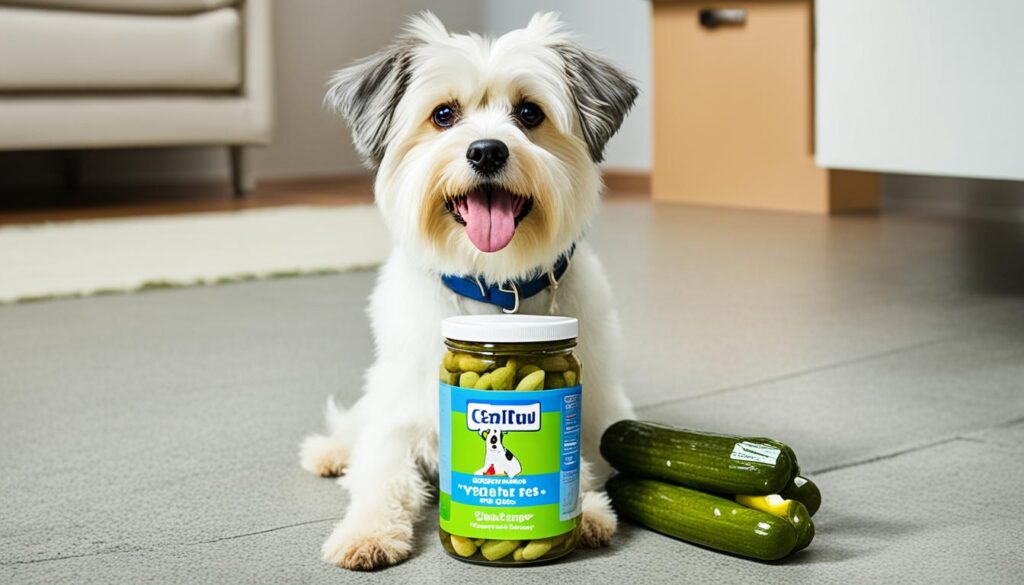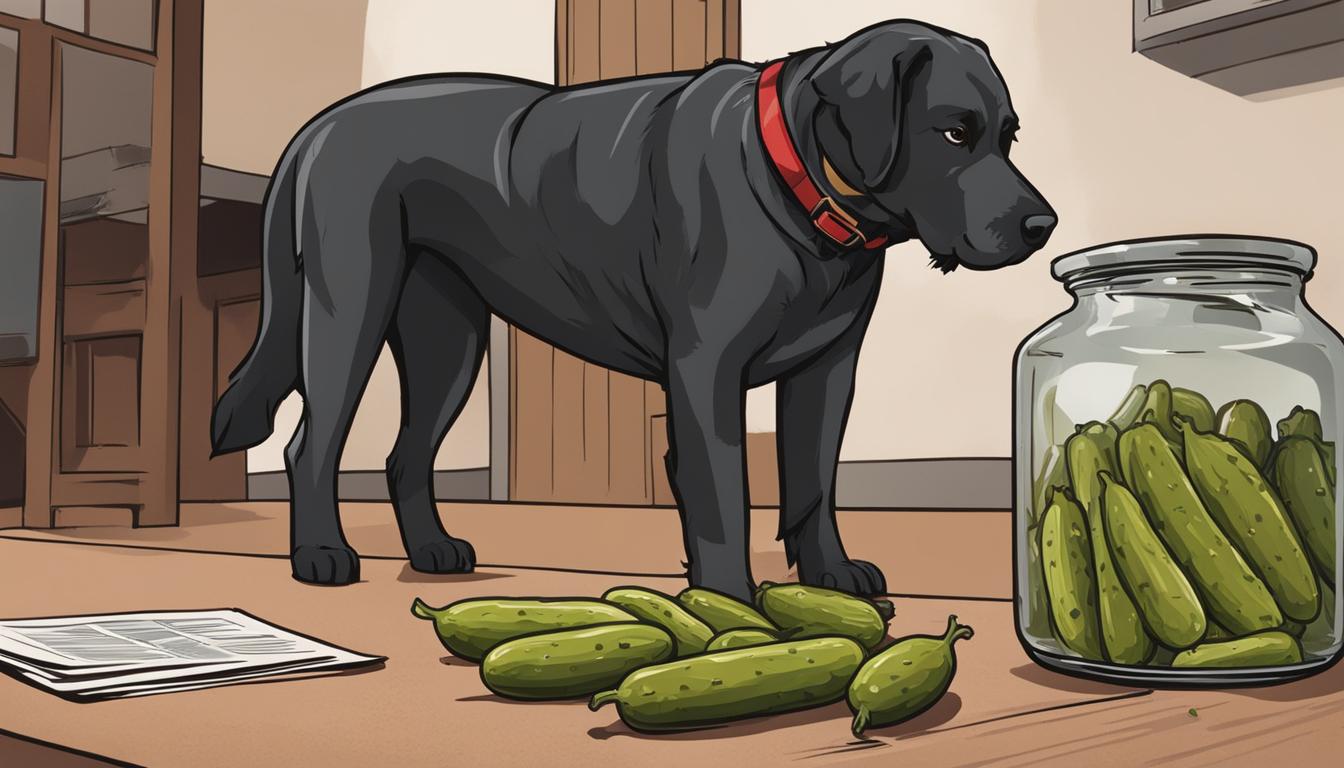As an Amazon Associate I earn from qualifying purchases.
Picture this: it’s a sunny afternoon, and you’re indulging in a tasty pickle snack. The tangy crunch fills your mouth with delight, and you savor every bite. Suddenly, your furry companion looks up at you with those pleading eyes, hoping for a share of the pickle goodness. But before you toss them a slice, it’s important to ask yourself: can dogs have pickles?
You see, our four-legged friends have unique dietary needs, and not everything we enjoy is safe for them. While dogs may have an insatiable appetite and seem eager to try anything, it’s crucial to know which foods can be harmful to their health. In the case of pickles, there are a few things you should consider before dishing out a treat.
Now, let’s dive into the details and explore whether pickles are a safe choice for our canine companions.
The Risks of Feeding Pickles to Dogs
Feeding pickles to dogs may seem harmless, but it can actually pose several risks to their health. It’s important to understand the potential dangers associated with pickles and why they may not be safe for your furry friend.
One of the main concerns when it comes to pickles is their high salt content. Dogs have a much lower tolerance for sodium compared to humans, and excessive salt intake can lead to salt poisoning. This can cause dehydration, electrolyte imbalances, and other serious health problems in dogs. So, while you may enjoy the tangy taste of pickles, they can be dangerous for your canine companion.
Onions and garlic are commonly used in the pickling process and can be found in many types of pickles. These ingredients contain compounds that can damage a dog’s red blood cells, leading to a condition called anemia. Anemia can cause weakness, fatigue, and a range of other health issues in dogs. Therefore, it’s best to avoid feeding pickles to your furry friend to prevent any potential harm.
Did you know that sweet pickles can also be problematic for dogs? They often contain high levels of sugar, which can contribute to weight gain and dental problems. Just like in humans, excess sugar consumption can lead to obesity and tooth decay in dogs. So, even if your pup has a sweet tooth, it’s best to steer clear of sweet pickles to ensure their overall health and well-being.
Dogs with specific health conditions should especially avoid pickles. For instance, dogs with heart or kidney disease, diabetes, obesity, or dental problems can be more susceptible to the risks associated with pickles. It’s crucial to prioritize their health and choose alternative, dog-friendly snack options.
Remember, every dog is unique and may react differently to certain foods. If you suspect your dog has ingested pickles or shows any signs of discomfort or illness after eating them, it’s important to seek veterinary assistance immediately.
In the next section, we’ll explore the health benefits of cucumbers, a safer alternative to pickles, for dogs.
Image:
Health Benefits of Cucumbers for Dogs
While pickles may not be suitable for dogs, cucumbers, which are the main ingredient in pickles, have several health benefits for dogs. Cucumbers are low in calories and sugar, making them a great snack option for overweight and diabetic dogs. They are also high in fiber, which aids in digestion. Cucumbers contain vitamins A, K, and C, as well as minerals like magnesium, manganese, calcium, potassium, and phosphorus. These nutrients contribute to a dog’s overall health and well-being.
If you’re looking for dog-friendly pickle options or a healthier alternative to pickles, cucumbers can be a great choice. They can be offered as a refreshing snack, chopped and added to meals, or even frozen as a fun treat during hot summer months. Just remember to remove the cucumber skin and seeds, as they may be difficult for some dogs to digest.
Cucumbers can also be used as a pickles in a dog’s diet, providing a crunchy and hydrating element to their meals. However, it’s important to introduce cucumbers gradually into your dog’s diet and monitor for any adverse reactions. Some dogs may have sensitivities or allergies to cucumbers, so it’s always best to consult with your veterinarian before making any significant changes to your dog’s diet.
Dog-Friendly Pickle Options
If you’re looking for pickles specifically made for dogs, there are some brands that offer dog-friendly pickle options. These pickles are specifically formulated with ingredients that are safe and beneficial for dogs. They are often low in salt, sugar, and other potentially harmful additives, making them a safer choice for your furry friend.
Potential Risks of Pickling for Dogs
While pickles may be a popular snack for humans, they can pose several risks to dogs when it comes to the pickling process itself. Various ingredients used in the brine can have negative effects on a dog’s health, making it important to consider the potential hazards of pickling for dogs.
Sodium Overload
One of the main concerns with pickles is their high sodium content. Dogs are much more sensitive to salt than humans, and excessive sodium intake can lead to salt toxicity, causing dehydration and various health issues. The salt in pickles can put a strain on a dog’s kidneys, making it essential to limit their consumption to prevent salt-related complications.
Onions and Garlic Dangers
The presence of onions and garlic in pickles can be particularly problematic for dogs. These ingredients belong to the Allium family and can be toxic to dogs, causing damage to their red blood cells and potentially leading to anemia. It is crucial to note that even small amounts of onions or garlic can have adverse effects on dogs, so it is best to avoid giving pickles to your canine companion altogether.
Did You Know? Onions and garlic, commonly used in pickling, can cause anemia in dogs by destroying their red blood cells.
Potential for Stomach Upset
In addition to the dangers posed by certain ingredients, some spices used in pickling can also cause stomach upset or toxicity in dogs when consumed in large quantities. Cinnamon and nutmeg, for example, can irritate a dog’s stomach and digestive system, leading to discomfort and potential health complications.
Image:

The Importance of Moderation and Consultation with a Vet
While pickles may not be recommended for dogs, enjoying them in moderation can be permissible. It’s important to remember that moderation is key in order to ensure your furry friend’s well-being. Treats, including pickles or other foods, should make up no more than 10% of a dog’s daily diet. This helps to maintain a balanced and nutritious meal plan.
When introducing new foods, such as pickles, it’s always advisable to consult with a veterinarian. Your trusted vet can provide valuable insights into whether pickles are safe for your dog’s specific health condition. They can also give you guidance on the appropriate portion size and frequency of pickle consumption. Your vet’s expertise will help you make informed decisions that prioritize your dog’s health.
Gradual introduction is the key to monitoring any adverse reactions. Start by offering small amounts of pickles to see how your dog’s system reacts. If there are any signs of stomach upset or discomfort, it may be best to avoid pickles altogether. Your veterinarian can advise you on suitable alternatives or dog-friendly pickle options.
Why Consulting a Vet is Essential
Consulting a vet about pickles for dogs is crucial for multiple reasons. Firstly, a vet can offer personalized guidance based on your dog’s individual health needs. Every dog is unique, and it’s essential to consider their medical history, current health condition, and any pre-existing allergies or sensitivities.
“A veterinarian’s expertise is invaluable in assessing the potential risks and benefits of incorporating pickles into a dog’s diet. This ensures that your pet remains healthy and receives the necessary nutrients.”
Secondly, a vet can help educate you about the potential risks and benefits associated with pickles for dogs. They can explain the specific reasons why pickles may not be recommended and offer alternative treat options that better suit your dog’s health requirements.
The Bottom Line: Dogs and Pickles in Moderation
In conclusion, while pickles may not be an ideal choice for dogs, enjoying them in moderation is possible. However, always consult with a veterinarian before introducing any new food into your dog’s diet, especially if it’s something as unique as pickles. Your vet’s guidance will ensure your pet’s well-being and help you make informed decisions about their nutrition.
| Potential Risks of Pickles for Dogs | Benefits of Consulting a Vet |
|---|---|
| High salt content can lead to salt poisoning | Personalized guidance based on your dog’s health needs |
| Onions and garlic can cause anemia | Awareness of potential risks and benefits of pickles |
| Sugar content can contribute to weight gain and dental issues | Alternative treat options for dogs with specific health conditions |
| Pickling process can introduce harmful ingredients | Expertise in assessing risks and benefits for your dog |

Conclusion
Well, it’s been quite a journey exploring the world of dogs and pickles. And the verdict is in, my friend: pickles are a no-no for our furry companions. As much as we love those tangy and crispy cucumbers soaked in brine, they can wreak havoc on a dog’s delicate system. The villainous ingredients in pickles, like onions, garlic, and excessive salt and sugar, can spell trouble for our canine pals.
But fear not, for all hope is not lost! Cucumbers, those unsung heroes of the pickle world, come to the rescue. They offer a refreshing and healthy alternative for our four-legged friends. Low in calories, high in fiber, and packed with essential vitamins and minerals, cucumbers are a dog’s best mate when it comes to tasty treats.
Remember, though, moderation is the key. While the occasional pickle mishap won’t send your pup into a tailspin, it’s always wise to consult with a veterinarian before introducing any new foods to your dog’s diet. Each dog is unique, and their dietary needs may vary. So be a responsible pet parent and seek expert advice!
FAQ
Can dogs have pickles?
What are the risks of feeding pickles to dogs?
What are the health benefits of cucumbers for dogs?
What are the potential risks of pickling for dogs?
How important is moderation and consultation with a vet when it comes to dogs and pickles?
Can dogs eat pickles? What’s the conclusion?
Source Links
- https://www.pumpkin.care/blog/can-dogs-eat-pickles/
- https://www.petinsurancereview.com/blog/can-dogs-eat-pickles
- https://www.thelabradorsite.com/can-dogs-eat-pickles/comment-page-1/
As an Amazon Associate I earn from qualifying purchases.

